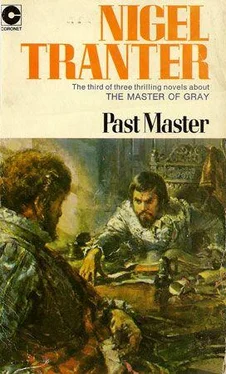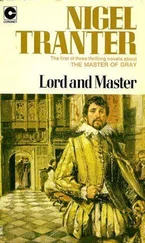Nigel Tranter - Past Master
Здесь есть возможность читать онлайн «Nigel Tranter - Past Master» весь текст электронной книги совершенно бесплатно (целиком полную версию без сокращений). В некоторых случаях можно слушать аудио, скачать через торрент в формате fb2 и присутствует краткое содержание. Жанр: Исторические приключения, на английском языке. Описание произведения, (предисловие) а так же отзывы посетителей доступны на портале библиотеки ЛибКат.
- Название:Past Master
- Автор:
- Жанр:
- Год:неизвестен
- ISBN:нет данных
- Рейтинг книги:5 / 5. Голосов: 1
-
Избранное:Добавить в избранное
- Отзывы:
-
Ваша оценка:
- 100
- 1
- 2
- 3
- 4
- 5
Past Master: краткое содержание, описание и аннотация
Предлагаем к чтению аннотацию, описание, краткое содержание или предисловие (зависит от того, что написал сам автор книги «Past Master»). Если вы не нашли необходимую информацию о книге — напишите в комментариях, мы постараемся отыскать её.
Past Master — читать онлайн бесплатно полную книгу (весь текст) целиком
Ниже представлен текст книги, разбитый по страницам. Система сохранения места последней прочитанной страницы, позволяет с удобством читать онлайн бесплатно книгу «Past Master», без необходимости каждый раз заново искать на чём Вы остановились. Поставьте закладку, и сможете в любой момент перейти на страницу, на которой закончили чтение.
Интервал:
Закладка:
Next day Patrick himself set off south-westwards, for Ayrshire, to inveigle, if he could, the Kennedys and their allies the Montgomeries and the Cunninghams, into the prompt armed service of the King. He promised that he would be back in three days at the latest.
Curiously enough, however, riding alone, once he was well clear of the Stirling vicinity, he turned his horse's head south-eastwards rather than south-westwards, towards the Border hills.
That same afternoon, whether as a result of the journey from Edinburgh or merely because of the fullness of time, Queen Anne's pains began. A strange young woman, she had had a number of false pregnancies, over which she had made the maximum fuss, setting her household by the ears; throughout the long period of this true pregnancy she had been difficult and demanding; but now, with the actual birth-throes upon her, she discarded all this, became calm and quietly assured, dismissed all her feather-headed and chattering ladies except the diffident young Lady Beatrix Ruthven who was her close friend and confidante, and Mary Gray whom she apparently trusted in an extremity, and sent for the midwife. To Mary she awarded the unenviable task of keeping her unsuitably interested and vocally anxious husband out of her chamber as much as possible.
Mary, therefore, spent much of the rest of the day and evening in an ante-room of the Queen's bedroom, discussing and indeed concocting poetry with King James, conceiving this to be the surest way of distracting his attention from what was going on next door. New stanzas were added to the natal epic – some of which pleased the royal composer so greatly that nothing would do but that they should be taken through forthwith and read to the labouring Queen, despite her evident lack of appreciation. James was also much interested in Mary's feeding of her own baby, which took place at intervals.
Inspiration in verse was still not quite exhausted when, at last, a child was born late that evening on the 17th of February 1594 – a son, somewhat weakly and small, but with none of the dire disabilities or deformities which the King, in moments of stress, had confessed to Mary as dreading, convinced as he was of the personal vendetta of Satan against himself, as Christ's Vicar and Vice-regent here upon earth.
James's relief and delight knew no bounds. Quite ignoring his exhausted wife, even before the child was properly wrapped and bound, he insisted on taking and parading the new-born Prince Henry throughout the castle, showing him to all whom he could find to look, courtiers, men-at-arms and servants alike, to the wailing not only of the infant but of the midwife and wet-nurse also. Mary, with Ludovick, accompanied the monarch on this tour, and indeed after some time she managed to prevail upon the exultant father to let her comfort the limp infant at her own breast. It demanded considerable dissuasion to prevent James from carrying out his heir to inspect the great bonfire which he had given immediate orders should be lit on the top-most tower of the castle, as signal to all the realm that a Prince of Scotland was born. If, throughout this perambulation, Ludovick was told once by his gleeful royal cousin that his eye was now put out, that he was fallen from high estate and no longer heir to the throne, he was told a dozen times. That the younger man was far from downcast, indeed even relieved, strangely enough did not commend itself to the other, either.
No one about the Court achieved bed until the early hours of the morning.
Next day brought to light a rift within the lute. James had had a nightmare. He had dreamed that the new prince had indeed been seized and spirited away from him, his mother playing a leading part in the abduction and going off with the kidnappers. Nothing would do now but that the precious infant should be delivered forthwith into the sure care of the Earl of Mar, to be kept in the most secure inner fastness of the fortress, with his wet-nurse. Queen Anne's indignation and protest at this decision was fierce but unavailing. She had already reverted from her excellent birth behaviour to the tantrums of the pregnancy period, and had taken a violent dislike to the wet-nurse, loudly declaring that the woman was a coarse and lowbred slut and that she should not be allowed to suckle the heir of a hundred kings. Mary Gray was to suckle the prince, she asserted, and although that young woman protested that she had her own child to feed and had not enough milk for both, the Queen was adamant. When confronted with James's fiat that the infant was to be put into Mar's keeping there and then, there was a major and unedifying scene, which ended with the King insisting on his decision, but agreeing that meantime Mary should act as foster-mother, despite the latter's objections.
So willy-nilly, Mary found, herself in the situation, absurd as it was unwanted, of ostensible foster-mother to the new prince, temporary link between the indignant Queen and her offspring, and repository of the sovereign's confidences. A new wet-nurse was found for the infant, of course – for despite the royal desires, even commands, she would by no means agree to taking over the nursing of the prince herself and handing over her own son to another's feeding. James and Anne were more openly estranged than ever they had been, the Queen pouring out her troubles in the reluctant ear of the Duke of Lennox especially – whilst the nation, by royal decree, made holiday in public rejoicing, ringing church-bells, lighting beacons and composing loyal addresses.
This was the state of affairs to which Patrick Gray returned after two days – undoubtedly to his entire satisfaction. Whilst sympathising with everyone's problems, he had an air about him as though matters could hardly have been bettered had he arranged them himself.
All was well with the Kennedy project, he reported. While the young Earl of Cassillis was under age, and his uncle and Tutor, Kennedy of Culzean was unpopular, the leadership of that warlike clan had been assumed by the Laird of Bargany, head of the next most senior branch, a forceful and ambitious man who had readily responded to the Master's approaches on the royal behalf, on promise of pickings from the estates of the Catholic Lords Maxwell and Sanquhar. Moreover Bargany's sister was Countess of Eglinton, mother of the boy Earl, chief of the Montgomeries. This latter family was linked with the Campbells of Loudoun, the south-western branch of the great Clan Campbell. These also the Master had called upon. One thousand men of Ayrshire would be ready to march within the week, two thousand in a fortnight, and more if required. With Argyll's Campbells and the Border moss-troopers of the King's firm friends the Homes, a force was being born sufficient to meet the Catholic threat.
This news was well received – but the difficulty now was for anyone to maintain a belief that any such threat really existed. As the days passed and no action developed, no signs of subversion appeared, men began to doubt. The Chancellor had always pooh-poohed it all; now he sent messages to James declaring that it was all a fantasy, an alarum perpetrated by the wicked Master of Gray for his own ends. Indeed he strongly advised the King to forbid this unwarranted and dangerous assembling of armed men forthwith, as a menace to the security of the realm. Who could tell what ill uses they might be put to -especially the cateran and barbarous Campbells? It was always easier to raise the Devil than to lay him again.
Patrick smiled, unruffled, at all this. Was his information apt to be mistaken, he demanded? It would be ignored at peril. Let His Grace call a parliament, he advised, at which the Catholic lords should be summoned to appear for trial of treason, of conspiring against the realm with the King of Spain, and with plotting against the King's life. Since Bothwell was still ostensibly a Protestant, let him be summoned on a different charge – that of receiving English support against his liege lord, of accepting English money and arms to equip his forces illegally assembled. That, which was truth, Patrick assured, as he knew on best authority, should serve the case. The alleged conspirators, if they were indeed innocent, would come to the parliament to proclaim their innocence. If they stayed away, they as good as admitted their guilt – and anyway could be proceeded against as disobeying the King's summons. liven Mait-land, who was a great parliament man, and the Kirk leaders whose policy was to strengthen their temporal power through parliament, could not disagree with this advice. It would takeat least a month to organise and stage a meeting of parliament, because of the distances to be travelled and the arrangements to be made. Patrick privately assured the King that things would, in fact, come to a head before the parliament could meet, and urged that the forces which he had been conjuring up for the royal protection should be maintained in immediate readiness to move.
Читать дальшеИнтервал:
Закладка:
Похожие книги на «Past Master»
Представляем Вашему вниманию похожие книги на «Past Master» списком для выбора. Мы отобрали схожую по названию и смыслу литературу в надежде предоставить читателям больше вариантов отыскать новые, интересные, ещё непрочитанные произведения.
Обсуждение, отзывы о книге «Past Master» и просто собственные мнения читателей. Оставьте ваши комментарии, напишите, что Вы думаете о произведении, его смысле или главных героях. Укажите что конкретно понравилось, а что нет, и почему Вы так считаете.












